| |
The
Columbus Myth Exposed At Last!! |
|
How the Spanish
Inquisition Stole the New World from England!!
| 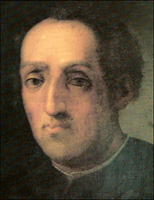
Portuguese
Christopher Columbus
(1436-1506). |
|
On
August 3, 1492, Christopher Columbus set sail from Spain with
3 ships: the Niña, the Pinta and the Santa María.
He used the maps and charts of a dead pilot named Alonso Sanchez
and arrived on the island of Santo Domingo on Oct.12. Martin
Alonso Pinzón, the captain of the Pinta was the first
to land, followed by Vicente Yañez Pinzón, the
captain of the Niña.
On
Oct. 28, he proceeded to another ISLAND named Cuba.
He left those ISLANDS on Jan. 2, and arrived back in Spain on
March 15, 1493. He never saw or set foot on
the mainland of the New World until his 3rd voyage,
6 years later on August 5, 1498.
Immediately
after his discovery of some ISLANDS off the coast of the mainland,
his sponsors Ferdinand and Isabella, petitioned the Pope to
give them not only the ISLANDS which Columbus had discovered
but the still undiscovered MAINLAND!! |
By
coincidence it just so happened that a Spanish Pope by the
name of Rodrigo Borgia was the head of the church of Rome at that
time. He drew a line from the North Pole to the South just west of
Africa (Cape Verde Islands) and he gave everything WEST of that line
to the Spanish. Due to complaints by the Portuguese, the line was
later moved further west but Pope Alexander never approved of that
change.
Pope
Alexander VI gave the New World to Spain
Pope
Alexander VI (Rodrigo Borgia) used a FORGED document called the Donation
of Constantine as his authority for giving the New World to Spain:
"Wherefore,
in order that the supreme pontificate may not deteriorate, but may
rather be adorned with glory and power even more than is the dignity
of an earthly rule; behold, we give over and relinquish to the aforesaid
our most blessed Pontiff, Sylvester, the universal Pope, as well
our palace, as has been said, as also the city of Rome, and
all the provinces, places and cities of Italy and the western regions"
This Donation was
a blatant counterfeit from the Dark Ages. There never was a Pope Sylvester
as Roman Emperor Constantine was the
first Pope.
Pope Alexander VI
took time out from his busy schedule of watching bullfights
by day and having orgies at night to write a BULL giving the
New World to Spain and warning every other nation to keep "hands
off."
"Furthermore,
under penalty of excommunication late sententie to be incurred
ipso facto, should anyone thus contravene, we
strictly forbid all persons of whatsoever rank, even imperial and
royal, or of whatsoever estate, degree, order, or condition,
to dare, without your special permit or that of your aforesaid heirs
and successors, to go for the purpose of trade or any other reason
to the islands or mainlands, found and to be found, discovered and
to be discovered, towards the west and south, by drawing and establishing
a line from the Arctic pole to the Antarctic pole.... Let no one,
therefore, infringe, or with rash boldness contravene, this our recommendation,
exhortation, requisition, gift, grant, assignment, constitution, deputation,
decree, mandate, prohibition, and will. Should anyone presume to attempt
this, be it known to him that he will incur the wrath of Almighty
God and of the blessed apostles Peter and Paul.
Given at Rome, at St. Peter's, in the year of the incarnation of our
Lord one thousand four hundred and ninety-three, the fourth of May,
and the first year of our pontificate" (Papal
Bull granting the New World to Spain, May 4, 1493).
| 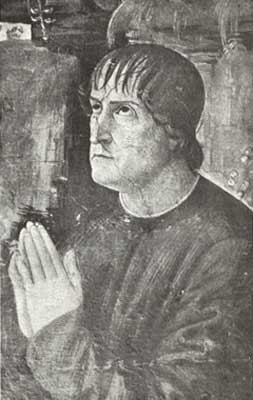
Pope
Alexander VI (1492-1503), the infamous Borgia, gave the New
World to Spain. He was a MONSTER of iniquity even by the standards
of his day. |
|
"There
is more than one Chamber of Horrors in the Museum of History,
but none like that of the Borgia. The central figure is that of
Rodrigo Borgia, who as Alexander VI sat on the papal throne for
eleven years; around him are grouped his mistresses; a brood of
bastard children; a retinue of henchmen and an endless procession
of victims. It was the darkest period in the life of Christianity,
just before the dawn of the Reformation. Rome had become a sink
of unspeakable corruption where, in the words of Dante, "Christ
was sold every day" (Bond, In
the Pillory, The Tale of the Borgia Pope, p. 9). |
The
King and Queen of Spain had many spies in Bristol and London notifying
them of the Cabot voyages of discovery!!
The
real motivation for sending Columbus was the voyages of Discovery
of John Cabot:
"The fleet
he (John Cabot) prepared, which consisted of five was provisioned
for a year. News has come that one of these, in which sailed another
Friar Buil, has made land in Ireland in a great storm with the ship
badly damaged. The Genoese kept on his way. Having seen the course
they are steering and the length of the voyage, I find that what
they have discovered or are in search of is possessed by Your Highness
because it is at the cape which fell to Your Highness by the convention
with Portugal. It is hoped they will be back by September.
I will let Your Highnesses know about it"(Pedro
de Ayala letter from London).
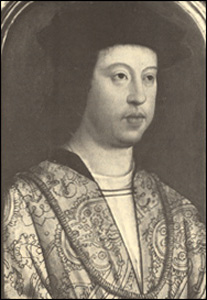
Ferdinand
the Catholic (1452-1516), King of Aragón.
|
Ferdinand
and Isabella sent Alonso de Hojeda on a murderous mission
to destroy the New World colony of John Cabot.
As
in the case of the "Invincible" Armada, the Portuguese
were partners in crime with the Spanish in the effort to stop
the English exploration.
|
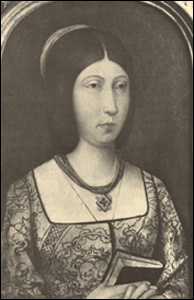
Isabella the Catholic (1451-1504), Queen of
Castile and León.
|
Ferdinand
and Isabella (Ahab and Jezebel) together made up the united kingdom
of Spain. They were determined to stop the English colonization of
the New World at any cost. Their daughter, Catherine of Aragon,
eventually became the wife of Henry VIII. This marriage alliance would
give them an excuse to maintain a large diplomatic mission as
their eyes and ears at the London Court.
Having
heard of the plans of the King of England to send out a new expedition,
Ferdinand and Isabella sent a notorious conquistador and
cold blooded murderer named Alonso de Hojeda to intercept them.
Alonso
de Hojeda was licensed to kill by Ferdinand and Isabella!!
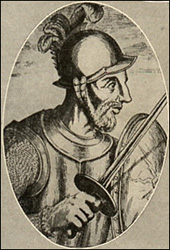
Alonso
de Hojeda
(1468-1515).
|
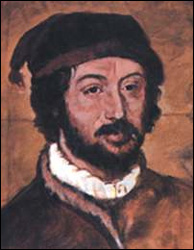
Mapmaker
Juan de la Cosa
(1460-1510). |
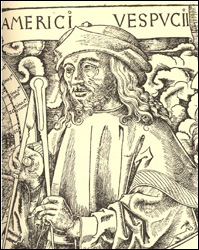
Amerigo
Vespucci
(1451-1512).
|
Ferdinand
and Isabella granted Alonso de Hojada a license to kill and
sent him to intercept the Cabot expedition. This was a practical
demonstration of the Papal Bull of their boss, Pope Alexander
VI.
"Item:
that you go and follow that coast which you have discovered, which
runs east and west, as it appears, because it goes
toward the region where it has been learned that the English were
making discoveries; and that you go setting up marks with
the arms of their Majesties, or other signs that may be known, such
as shall seem good to you, in order that it be known that you have
discovered that land, so
that you may stop the exploration of the English in that direction"(Alonso
de Hojeda license to kill).
Hojeda
set sail from Spain on May 20, 1499, with 4 ships. He was accompanied
by mapmaker Juan de la Cosa and Amerigo Vespucci claimed
to have sailed with them.
They
intercepted the Cabot expedition somewhere off the coast of Venezuela.
All the men were killed and their maps stolen. This was a flagrant
act of war by the Pope and Spain upon a peaceful voyage of discovery
Here
is a quote from a Spanish historian named
Martín Fernández de Navarrete:
| "It
is certain that Hojeda in his first voyage (that of 1499) encountered
certain Englishmen in the vicinity of Coquibaçoa"
(Colección de los viages y descubriementos, vol.
III, Madrid, 1829, p. 41). |
|
The
Spanish text reads:
"Lo cierto es que Hojeda en su primer viage halló
á aciertos ingleses par las immediaciones de Coquibaçoa"
(Martin Fernandez de Navarrete). |
The
famous Juan de la Cosa map.
Only John Cabot
had charted the New World coastline up to that time. Here is the oldest
map of the New World showing English flags all the way from Newfoundland
to Florida. For 3 centuries it lay in the secret archives of the Vatican
until it was carried to Paris by Napoleon Bonaparte in 1810.
| 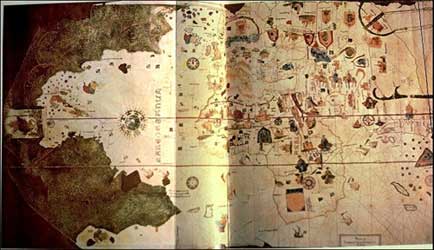
The
Juan de la Cosa map. |
Famous
map by Juan de la Cosa from the year 1500. It shows the flags
of Castile and Leon in the vicinity of Cuba and the English
flags covering all of the New World coastline from Florida
to Canada.
|
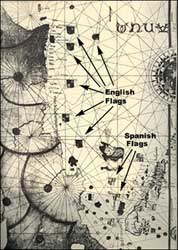
Map showing
English flags on New World.
|
The original
parchment of this map or chart, a piece of ox-hide measuring 37.5
x 72 inches (96 X 183 cm), superbly illustrated in ink and water colors,
was found in 1832 in a shop in Paris by Baron Walckenaer, a bibliophile
and the Dutch Ambassador, and was brought to the attention of the
world the following year by Alexander Humboldt, the famous German
scholar. Upon the death of Baron Walckenaer in 1853 the map was purchased
by the Queen of Spain, and though greatly deteriorated, is now the
chief treasure of the Museo Naval in Madrid.
When
Napoleon invaded Rome in 1810, a portion of the vast secret archives
of the Vatican were taken to Paris for a world library that Napoleon
planned to build. After his defeat, many of the documents were taken
back to Rome but many were left behind. This map was one of the priceless
items left behind and ended up in a Paris bookshop. (Ambrosini, The
Secret Archives of the Vatican, p. 291).
How
America got its name. A Vespucci sting
operation!!
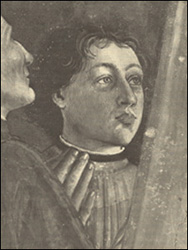
Amerigo
Vespucci (1451-1512).
Amerigo
Vespucci as a boy. This earliest known portrait shows him
in front of a image of the Madonna.
|
|
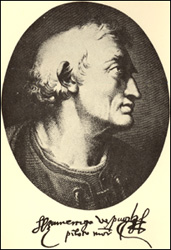
Portrait
and signature of Vespucci, 1508.
Vespa
from which the name Vespucci is derived is the Italian
word for WASP. The entire New World has received a nasty sting
of venom from the wasp Amerigo Vespucci. |
Amerigo
Vespucci (son of Nastagio Vespucci) was born into the rich money lending
Vespucci family in Florence, Italy on March 9, 1451. The family was
related to the rich and powerful money lending Medici banking cartel.
Several of the Medici
dynasty became Popes among them was the infamous Leo X who excommunicated
saint Martin Luther:
"Amerigo
had to cross Florence twice daily to attend a private school at the
Convent of San Marco conducted by his uncle, (Dominican) Father Giorgio
Antonio Vespucci. There one of his schoolmates was Pier Soderini who
rose to be gonfaloniere (prime minister) of the Florentine
Republic—to whom he addressed his famous Lettera. Amerigo
entered the commercial house of Lorenzo di Pier Francesco de' Medici,
who sent him in 1491, after twenty years' service, to Seville as head
employee of a Medici affiliate, Juanoto Berardi. He was then almost
forty years old. At Seville his main business was merchant banking
and ship chandlery. Upon the death of Berardi in 1495, Vespucci became
head of the house, and as such helped to outfit Columbus's fleet for
the Third Voyage in 1498."(Morison, The European Discovery
of America, vol. II, p.279).
John
Cabot's Bristol paymaster was named Richard Amerike!!
Intimate
details of the Cabot voyages were sent back to Spain including maps.
Now it so happens that John Cabot had a paymaster
named Richard Amerike. John Cabot
had a habit of giving away islands to his friends:
"I
have also spoken with a Burgundian, one of Messer Zoane's companions,
who corroborates everything. He wants to go back, because the Admiral,
which is the name they give to Messer Zoane, has given him an island.
He has given another to his barber, a Genoese by birth, and both consider
themselves counts, while my lord the Admiral esteems himself at least
a prince" (Letter to the
Duke of Milan about John Cabot's discovery of the New World).
It
is certain that John Cabot wrote the name of his paymaster (Amerike)
on one of the islands or perhaps on the MAINLAND ITSELF:
"
. . .but with the help of the enclosed copy you (Columbus) will be
able to ascertain what you wish to know, since the capes of tierra
firma and the islands are therein named and you will also see
there where the first landfall [primera vista] took place,
because it was on the return [course] that was found the major part
of the land. "(John Day's letter
to Columbus).
When
Verspucci saw the name Richard Amerike either on a map of the New
World or among the papers of John Cabot he noticed the similarity
of names. Right there and then his devilish mind began to concoct
a scheme to supplant Richard Amerike and name the New World after
himself.
A
Catholic historian named Bartolomé de la Casas wrote about
the "long premeditated plan of Vespucci to have the world acknowledge
him as the discoverer of the largest part of the Indies." (de
las Casas, History of the Indies, p. 95).
Amerigo
Vespucci never voyaged to the New World!!
Because of the similarity of names, the Florentine fraudster saw the
opportunity to steal a whole New World from the English and name it
after himself. He was a usurer or moneylender by profession so stealing
or reaping where others have sown was no problem for him as that was
his chosen profession!!
| 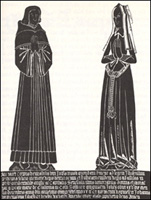
Memorial
brass of Richard Amerike's daughter Joan, in Bristol, England. |
|
Richard
Amerike was the paymaster for John Cabot!!
"Fig.25:
Memorial brass of Richard Amerike's daughter Joan, and her husband
John Brook, to be seen virtually alongside that of John Jay
in the chancel of Bristol's St. Mary Redcliffe church. The Latin
inscription reads: 'Here lies the body of that venerable man
John Brook, serjeant-at-law to that most illustrious prince
of happy memory King Henry VIII and Justice of Assize for the
same king in the western parts of England, and chief steward
of the honourable house and monastery of the Blessed Mary of
Glastonbury in the County of Somerset in which John died on
the 25th day of December 1522. And near him rests Joan his wife,
one of the daughters and heirs of Richard Amerike, on whose
souls may God have mercy, Amen." (Wilson, The Columbus
Myth, p.167). |
If
the New World was named after Vespucci it would be named Vespuccius
after his last name. At that time, commoners used their last names
and royalty used their first names when naming countries. If the continent
was named after Christopher Columbus it would be named COLUMBIA. .
. .This is more evidence that Vespucci stole the name from Richard
Amerike.
Editor's
Notes
As
the great Discoverer of the New World sailed down the River Avon,
he would pass Brandon Hill named after the GREAT Hibernian missionary
St. Brendan, who arrived on the same continent 1,000 years beforehand.
A shrine was erected in his honor and sailors would pray for protection
to the saint. The shrine was torn down at the time of the Reformation
and sailors were admonished to pray to the God of St. Brendan . .
. and not to St. Brendan . . . for protection.
|
|
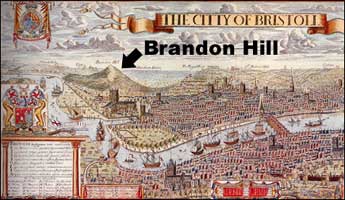
Brandon
Hill, named after the great Hibernian missionary St.
Brendan. |
|
Vital
Links
References
Ambrosini,
Lucy with Mary Willis.The Secret Archives of the Vatican. Little,
Brown & Co., Boston, 1969.
Broome,
Rodney.The True Story of How America Got Its Name. MJF Books,
New York, 2001.
Biddle,
Richard. A Memoir of Sebastian Cabot. Philadelphia, 1831. Reprinted
in 1915.
Casas,
Bartolomé de las. History of the Indies. Harper &
Row, New York, 1971,
Harrisse,
Henry. The Discovery of North America. N. Israel, Amsterdam,
1961.
Harrisse,
Henry. The Diplomatic History of America: Its First Chapter (1452-1494).
B. F. Stephens Pub. London, 1897.
Hoffman,
Bernard G. Cabot to Cartier. University of Toronto Press, 1961.
Hibbert,
Christopher. The House of Medici, Its Rise and Fall. William
Morrow, New York, 1975.
Lester,
Edwards C. The Life and Voyages of Americus Vespucius. New
Amsterdam Book Co., New York 1903.
Morison,
Samuel Eliot. The European Discovery of America. in 2 volumes,
Oxford University Press, 1974.
Morison,
Samuel Eliot. Admiral of the Ocean Sea, A Life of Christopher Columbus.
Little, Brown & Co., Boston, 1942.
Navarrete,
Martín Fernández de,
Colección de los viages y descubriementos. 5 volumes,
Madrid, 1829.
Pohl,
Frederick J. Amerigo Vespucci Pilot Major. Octogon Books, New
York, 1966.
Quinn,
David Beers. England and the Discovery of America. Alfred A.
Knopf, New York, 1974.
Wilson,
Ian. The Columbus Myth, Did Men of Bristol Reach America Before
Columbus? Simon & Schuster, London, 1991.
Wilson,
Ian. John Cabot & the Matthew. Redcliffe Press, Bristol,
England, 1996.
Williamson,
James, A. The Voyages of the Cabots & The English Discovery
of North America. Argonaut Press,
London, 1929.
Copyright
© 2007 by Niall Kilkenny
Back
to Main Menu
|












